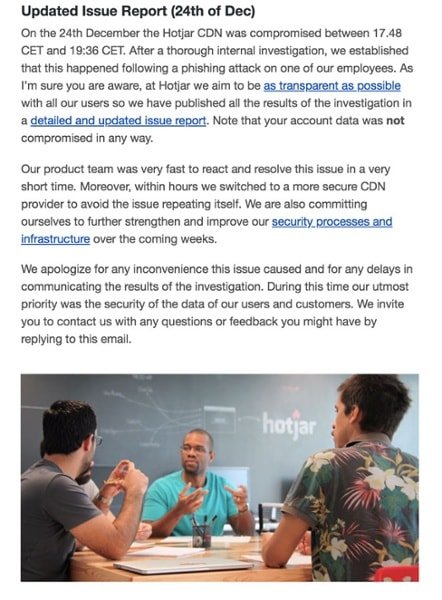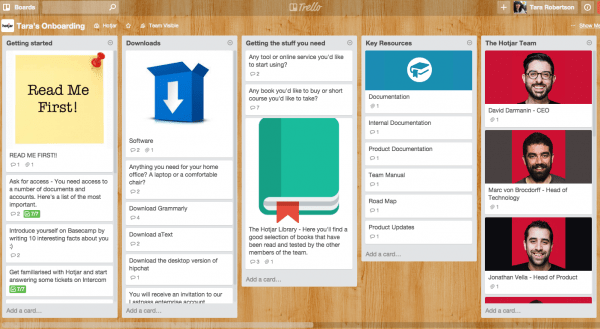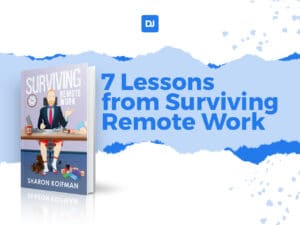“Cons: I’m racking my brain…and can’t come up with much.” – Anonymous Hotjar Employee on Glassdoor.
When a company scores a five-star rating on an anonymous review site, you have to presume they’re doing something right. It certainly piqued our interest, so we decided to learn more. If you want us to learn about your company, ping us.
Hotjar provides on-page user behavior insights through recorded sessions of scrolling, clicking, and mouse movement heatmaps, as well as a feedback system. Combining these data, a growth marketer can improve the performance metrics of a conversion funnel. It adds similar value in product development and web designing. An excellent tool that 6600 users love.
But what struck us beyond that was how close to a “dream” company Hotjar appeared to be. That is to say; there is often a rift between how a company positions itself on its website versus how they seem on third-party sites.
Hotjar is different – everyone is on the same page, users and employees love this company. They may be small (although growing steadfastly), but because of their work ethics, they are in a league of their own.
The Hotjar Way – Fully-Remote, Unicorn Included
“At the end of the day, a remote culture is something that continues to thrive at Hotjar.” – Tara Robertson, VP of Marketing, Hotjar
In 2014, when David Darmanin co-founded Hotjar, he wanted his company to be fully-remote. Having worked remotely before, he agreed there’s no better way to work. Sure, they still have an HQ in Malta, but only the postman uses it – to make deliveries and such.
He says: “there is one main advantage [to being fully-remote]… the ability to hire the best people from anywhere in the world. This makes it easier to build and sustain your company culture” — a belief we’ve held firmly since day one.
Now they are a group of 25+ employees across Asia, Europe, and America – with annual recurring revenue of €15 million.
Hotjar is process-oriented, and they’ve optimized every process for remote work. The company collectively stresses personal growth, being diverse, and open-minded, while sharing common goals, and having a lot of fun along the way. (The company has an inflatable pet unicorn at its headquarter in Malta.)
Nevertheless, Hotjar remains astute about whom to bring into their team. They’ve tailor-made a hiring process that helps them select people who’ll fit into their remote work culture seamlessly. A process that includes a survey, interviews, completing tasks, and spending time with other team members.
As Tara Robertson asserts, “We believe that your culture is your brand.” That’s the Hotjar way.

The Remote Start-Up Mentality That’s Key to Hotjar’s Success
Hotjar continues to operate with the assiduity of a startup. Learning from their mistakes, getting feedback from customers and employees, “creating WOW moments for their users.”
They do good work speedily, rather than wait around for perfection. They remain ambitious, untethered by bureaucratic waylays.
But what sets them apart is their keen sense of transparency and accountability.
Transparency: It’s a common word that businesses slip into PR releases to appear “cool.” When it comes to actual transparency, few companies are as unrelenting as Hotjar. In their blog, they detail their ‘failures’ – such as launching the Hotjar mobile app that cost them 3500 dev hours and $200,000.
On 24th December 2015, when their CDN was compromised, David emailed all users explaining the issue, how it was resolved and a future action plan, so that no one was left in the lurch. But their ethos of transparency permeates more than admitting mistakes. As early as 2015, Hotjar started an incident log, which is still active today.
Accountability: As a startup, the initial Hotjar crew of 4-5 did everything from coding to hiring to customer service. That got in the way. And when they made a mistake in hiring the right person for their VP of Marketing, the dire need for ownership and accountability became obvious.
They revised the company’s structure at the most fundamental level. From ownership of the smallest daily activities to creating new positions like hiring managers, accountability came to the fore.
Both transparency and accountability have fostered a culture of collaboration, trust, and improvement at Hotjar.

Tools, Comms, and Shared Libraries at Hotjar
Tools: The Hotjar team uses the usual array of tools to integrate all facets of their work:
- HipChat – internal communication
- Basecamp – announcements
- Trello – collaboration
- Jira – organization
- GSuite – collaboration and planning
- Hotjar – user insights and feedback
- 15five – employee feedback
Communications: The team uses weekly sprint cycles to accomplish tasks, which they share on Trello. Every department holds daily scrum meetings for 15-30 minutes.
And every Friday, the whole company presents what they’ve accomplished that week. Each company unit has their group board, department board, and a personal message board to always stay in touch.
Shared Libraries: All Hotjar employees receive a Kindle when they’re hired, which they use to share and read books. The most important is the book StrengthsFinder 2.0, which every employee reads within the first week of coming onboard and completes the test at the end to determine their strengths. Their results are added to a workbook for everyone to see and leverage as they work.

5 Lessons Learned From Fully-Remote Company Hotjar
- Onboarding processes can reflect a company’s remote culture – The VP of Operations at Hotjar, Ken Weary claims that the company has the best onboarding process. Everything a new team member must know is detailed on Trello boards. Before the official process starts, other team members reach out via emails and help them fit into the new roles. We’ve been emphasizing the importance of a great onboarding process forever, but seeing it in action thrills us beyond measure.
- The word ‘family’ can be literal in a close-knit distributed team – To all the naysayers of remote work who state lack of personal interaction as a reason: Please get to know the Hotjar team. Whether they are goofing off on HipChat or taking on duties based on their particular talents, all Hotjar employees build each other up.
- Personal development and well-being are serious business – Not all who say they believe in their employees’ personal development and prosperity empower them like Hotjar. Here employees receive €1000/year for personal growth, €200/month as a well-being allowance, a Fitbit, and a flurry of other benefits.
- Working harder, faster, smarter has a better payoff – They believe in processes, not paperwork. Choose ‘good’ over ‘perfect.’ Like to check things off a list and eliminate ‘in-progress’ work. And they take small iterative steps that lead to big changes.
- Making “culture your brand” means living your core values – Left on dusty pages of websites, core values mean little. The Hotjar team, however, wields it to no end. They continually seek feedback and deliver the best to their clients. The remote culture they’ve created is strengthened by two yearly retreats. And the respect they have for each other translates to a disciplined team that values all its members.
It’s easy to see why so many applicants want to work at a company like Hotjar. And it’s not about the benefits. It’s the impeccable remote work culture they’ve created. This company is doing “remote work the right way” – not as a compromise or a secondary option but as the best way to work. We can definitely help you get a step closer to achieving that. All you need do is contact us.




